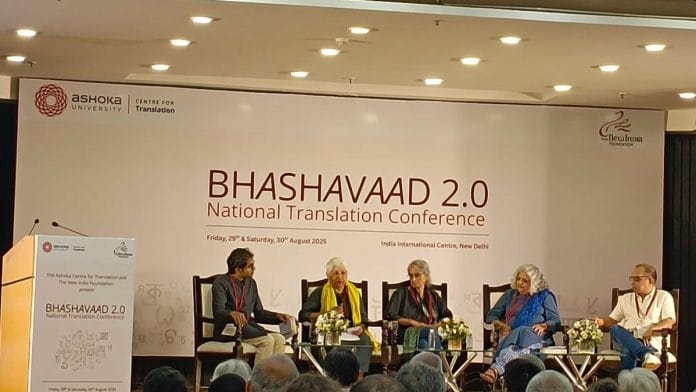New Delhi: Speaking at the second edition of Bhashavaad, a national conference on translation, Tejaswini Niranjana, translator and author, emphasised that translators do not merely render a book in a new language, but also open it up to an entirely new audience
“We need books about translators too, to truly understand what a translator’s work represents,” she said. “How many of you have ever wanted to know about the translator after finishing a book?”
The conversation explored the evolving dynamics of translation, the growing public demand for translated works, and how translation has become a powerful means of global connection. Despite this, translators continue to be marginalised, often still fighting for recognition—even for something as basic as having their name on a book’s cover.
Ashoka University’s Centre organised the conference in collaboration with The New India Foundation at the India International Centre, New Delhi.
It was attended by leading names in literature, including Peggy Mohan, Rana Safvi, Jerry Pinto, Tridip Suhrud, Ritu Menon, A.Revathi, Supriya Chaudhuri, Sana Goyal, Deepa Bhasthi, and Urvashi Butalia, along with several acclaimed translators, publishers, and scholars working across Indian languages.
In a packed hall of nearly 300 attendees, the discussion revealed how translators are often sidelined in the publishing industry and struggle to make a living from their work.
“Anyone who’s here to make a living from translation, don’t even bother. Find another day job. Do this because you love to translate,” said Niraja Gopal Jayal.
Women for women
The panel titled “Writing Women, Translating Women” brought together leading authors, activists, and translators such as Sumitra Mehrol, Urvashi Butalia, Saba Mahmood Bashir, and A Revathi to discuss the challenges of translating women’s voices.
As the stage was filled with women writers, translators, and publishers, the question of the visibility of translators shifted to the visibility of women in literature.
Butalia, co-founder of feminist publishing house Kali for Women, addressed the need to rethink not only what stories are told but also who gets to make editorial decisions.
“Many voices, women’s voices have remained unheard, unrepresented, or appropriated. We have to understand that knowledge is not created only by those in power,” she said.
Topics discussed at the panel included the difficulties of rendering experiences of gender and sexuality across languages, as well as the erasures, silences, and biases that often shape how women’s lives are written, remembered, and read.
“How can a common person understand the struggle a trans person faces after experiencing a crime or rape?” asked Revathi, writer and activist, emphasising the importance of having stories written by those who live, face, and witness these issues regularly, rather than by someone known who is merely reading about them.
Shifting focus from writing to translation, author Sumitra Mehrol emphasised the need for translators to belong to the same social or cultural space and to deeply understand the subject they are translating.
“If a translator has never been to a village and is translating a rural story, how can they truly grasp the writer’s perspective and reflect it accurately in the translated text?” Mehrol asked.
However, the discussion soon evolved into a debate about the liberties translators take and their importance. The tension between fidelity to the original text and creative interpretation became a central theme of the event.
“How many translators can truly, hand on heart, claim they have faithfully captured what the author intended to say? Have they truly conveyed the essence of the original?” an audience member asked.
Answering this question, Jayal said that to make the text engaging and preserve its essence, the translator’s involvement is not only important but necessary.
“The translator creates the conditions to make the text engaging,” said Jayal.
Future of translation
The event was divided into different sessions, each featuring a distinct set of panellists. As the discussions progressed and the event drew to a close, the question of the future naturally emerged: How will translators cope with the digital era and the growing competition from AI translation tools?
AI translation offers speed, affordability, and efficiency, making it an attractive option for the industry. However, they emphasised that no machine can make a text truly engaging or capture its unique essence.
“Translation is not mechanical—it is creative, political, cultural, and deeply relational,” said Arunava Sinha, translator.
Offering an example, writer Ira Pande said that when she used the word ‘mummy’ in a text, AI translated it into the Egyptian mummy in another language.
“The feeling a translator brings into a text is something a machine can never replicate,” she said.
(Edited by Theres Sudeep)






